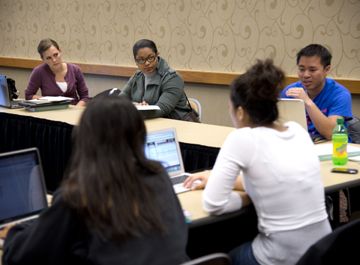Team working to certify Rawls Hall for energy sustainability
October 22, 2012
 |
|
Graduate
students in an Experiential Learning Project course are working together to
make Jerry S. Rawls Hall certified under the Leadership in Energy and Environmental
Design program. (Purdue University photo/Mark Simons) |
Michael Gulich, director of sustainability, is working with a team of graduate students to make Rawls Hall a more energy-efficient and greener building.
The team, composed of second-year MBA students, engineering and technology graduate students, is enrolled in an Experiential Learning Project course focused on making Jerry S. Rawls Hall certified under the Leadership in Energy and Environmental Design program.
Matt Lynall, clinical associate professor of management, is the director of the Experiential Learning Initiative program; for the LEED certification team, Gulich acts as the client for the student-led consulting team.
LEED certification is an internationally recognized program run by the U.S. Green Building Council that acts as a rating system for sustainability performance.
Guilch says the program acts as third-party verification for an unbiased, complete analysis of building performance.
"The LEED framework is considered the gold standard for assessing full-spectrum building performance," Gulich says.
Certification for existing buildings such as Rawls examines major building operations including water and energy consumption, green product use and waste stream management.
The project will help to identify any energy-related problems in the facility and position the building managers to make improvements.
Furthermore, the team will develop and propose plans/policies for green building protocols. For example, although many buildings on campus already use green cleaning products, a written green cleaning plan has yet to be fully documented. These various written plans will provide a basis for continuous improvement over time, for reporting on sustainability metrics, for training purposes, and for future LEED projects on campus.
Some low- or no-cost changes, such as behavioral changes, may be made immediately, while larger and more involved projects will be recommended for future planning.
Through the course, Gulich says the graduate students are learning how to approach a complex and roughly defined problem, manage a schedule and the processes to complete the self-defined tasks, and serve as consultants to a client.
There is already expressed interest in continuing the class for future years, and some nominations have been made for future buildings to study.
Gulich says energy conservation projects, such as gaining LEED certification, are important to Purdue and the University's commitment to being a responsible steward.
"Purdue is a long-term property owner and manager," Gulich says. "The problems we create or don't solve now will still be here in five, 10 and 15 years down the road."
Writer: Rachel Florman, rflorman@purdue.edu
